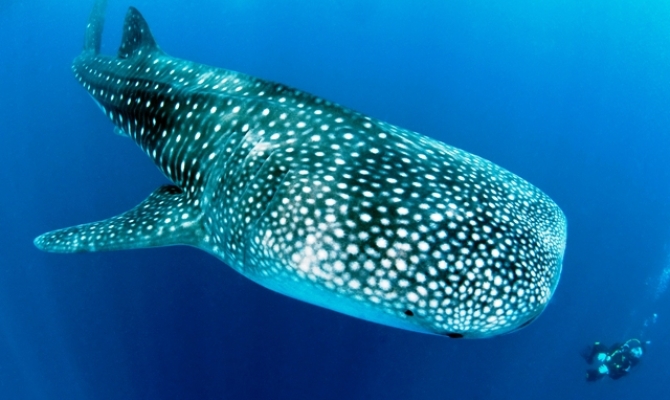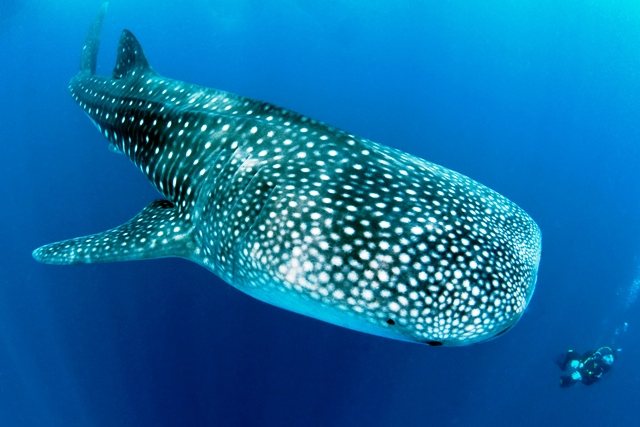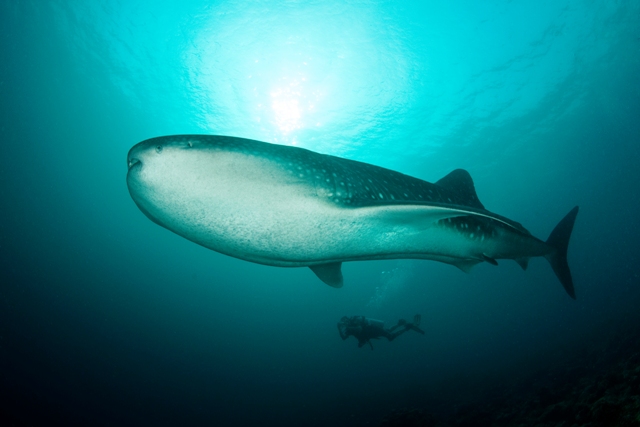
Island and Ocean Ecosystems
13 August 2014, Nadi, Fiji - Sharks are under serious threat around the globe with between 97 million and 273 million sharks killed annually. These alarming statistics have prompted global action, and stepping up to the plate are the 36 signatories, including the European Union, to the Memorandum of Understanding (MOU) on the Conservation of Migratory Sharks.
Nauru, Palau, Tuvalu and Vanuatu are the four Pacific islands included in the 36 signatories to this MOU that aims to achieve and maintain a favourable conservation status for migratory sharks. The Memorandum of Understanding on the Conservation of Migratory Sharks was opened in 2010 for signatories.

"We're really grateful that these Pacific islands have become part of this MOU to protect migratory sharks, it highlights our Pacific commitment as environmental leaders," said Ms. Penina Solomona, Convention on Migratory Species (CMS) Officer of the Secretariat of the Pacific Regional Environment Programme (SPREP).
"In 2009 a Pacific Regional Plan of Action to conserve sharks was developed as a partnership between Pacific regional agencies and Pacific island governments. In 2010, this global MOU was agreed under the CMS followed by the endorsement of an international conservation plan for migratory sharks. Our work in this area continues to grow."
Seven sharks - Basking Shark, Great White Shark, Longfin Mako Shark, Porbeagle, Shortfin Mako Shark, Spiny Dogfish and the Whale Shark are listed under Annex 1 of the MOU. The Basking and Great White sharks are listed in Appendix 1 of the CMS which means no taking is allowed, except under a “Special Exemption”. All of these sharks except the Spiny Dogfish migrate through the Pacific region.
A recent example of the Special Exemption to the No Take Status under Appendix 1 of the CMS in action is the work undertaken by the Government of Australia over their summer season. Australia allowed for sharks over 3 metres in size to be caught over a particular period to ensure human safety when swimming at beaches. As part of this the Government of Australia notified the CMS Secretariat to explain an exemption was taking place and why.
This year it is hoped that more Pacific island countries will sign on to the CMS Memorandum of Understanding on the Conservation of Migratory Sharks.
 Whale Shark Maldives. Photo courtesy of Lill Haugen
Whale Shark Maldives. Photo courtesy of Lill Haugen
"There are 23 marine species proposed for listing on the CMS appendices to be considered at the Conference of the Parties to the CMS in November this year. 21 of these are sharks and rays and most are found in Pacific waters," said Ms. Melanie Virtue, Head of the Aquatic Species Team of the CMS.
"The Pacific island countries are leading the world in the protection you provide for sharks and other marine species with the recent designation of a number of shark sanctuaries, some encompassing entire Economic Exclusive Zones. You have something valuable to share with the rest of the world, and at this COP, which is already being dubbed the ‘Shark COP’, it will be good to have a strong Pacific island voice to bring forward that message."
The Convention on Migratory Species aims to conserve terrestrial, aquatic and avian migratory species throughout their range. It currently has seven parties from the Oceania Region with Fiji being one of the newest parties.
A special session on the Convention of Migratory Species was part of the Pacific Joint Preparatory Meeting to the Convention of Biological Diversity COP12, Convention on Migratory Species COP 11 and Ramsar COP 12 is held in Nadi, Fiji from 11 to 15 August.
Countries represented at the one week conference are the Cook Islands, Fiji, Federated States of Micronesia, Kiribati, Marshall Islands, Nauru, New Zealand, Palau, Papua New Guinea, Samoa, Solomon Islands, Tokelau, Tuvalu and Vanuatu. Partners and stakeholders from the Pacific Islands Forum Secretariat, United Nations Development Programme, WWF Pacific, UNEP, CBD, CMS and CITES.
For more information on this Convention please visit: http://www.cms.int/sharks or please contact Ms. Penina Solomona at [email protected]
Nauru, Palau, Tuvalu and Vanuatu are the four Pacific islands included in the 36 signatories to this MOU that aims to achieve and maintain a favourable conservation status for migratory sharks. The Memorandum of Understanding on the Conservation of Migratory Sharks was opened in 2010 for signatories.

Whale shark, Maldives. Photo courtesy of Lill Haugen
"We're really grateful that these Pacific islands have become part of this MOU to protect migratory sharks, it highlights our Pacific commitment as environmental leaders," said Ms. Penina Solomona, Convention on Migratory Species (CMS) Officer of the Secretariat of the Pacific Regional Environment Programme (SPREP).
"In 2009 a Pacific Regional Plan of Action to conserve sharks was developed as a partnership between Pacific regional agencies and Pacific island governments. In 2010, this global MOU was agreed under the CMS followed by the endorsement of an international conservation plan for migratory sharks. Our work in this area continues to grow."
Seven sharks - Basking Shark, Great White Shark, Longfin Mako Shark, Porbeagle, Shortfin Mako Shark, Spiny Dogfish and the Whale Shark are listed under Annex 1 of the MOU. The Basking and Great White sharks are listed in Appendix 1 of the CMS which means no taking is allowed, except under a “Special Exemption”. All of these sharks except the Spiny Dogfish migrate through the Pacific region.
A recent example of the Special Exemption to the No Take Status under Appendix 1 of the CMS in action is the work undertaken by the Government of Australia over their summer season. Australia allowed for sharks over 3 metres in size to be caught over a particular period to ensure human safety when swimming at beaches. As part of this the Government of Australia notified the CMS Secretariat to explain an exemption was taking place and why.
This year it is hoped that more Pacific island countries will sign on to the CMS Memorandum of Understanding on the Conservation of Migratory Sharks.
 Whale Shark Maldives. Photo courtesy of Lill Haugen
Whale Shark Maldives. Photo courtesy of Lill Haugen"There are 23 marine species proposed for listing on the CMS appendices to be considered at the Conference of the Parties to the CMS in November this year. 21 of these are sharks and rays and most are found in Pacific waters," said Ms. Melanie Virtue, Head of the Aquatic Species Team of the CMS.
"The Pacific island countries are leading the world in the protection you provide for sharks and other marine species with the recent designation of a number of shark sanctuaries, some encompassing entire Economic Exclusive Zones. You have something valuable to share with the rest of the world, and at this COP, which is already being dubbed the ‘Shark COP’, it will be good to have a strong Pacific island voice to bring forward that message."
The Convention on Migratory Species aims to conserve terrestrial, aquatic and avian migratory species throughout their range. It currently has seven parties from the Oceania Region with Fiji being one of the newest parties.
A special session on the Convention of Migratory Species was part of the Pacific Joint Preparatory Meeting to the Convention of Biological Diversity COP12, Convention on Migratory Species COP 11 and Ramsar COP 12 is held in Nadi, Fiji from 11 to 15 August.
Countries represented at the one week conference are the Cook Islands, Fiji, Federated States of Micronesia, Kiribati, Marshall Islands, Nauru, New Zealand, Palau, Papua New Guinea, Samoa, Solomon Islands, Tokelau, Tuvalu and Vanuatu. Partners and stakeholders from the Pacific Islands Forum Secretariat, United Nations Development Programme, WWF Pacific, UNEP, CBD, CMS and CITES.
For more information on this Convention please visit: http://www.cms.int/sharks or please contact Ms. Penina Solomona at [email protected]